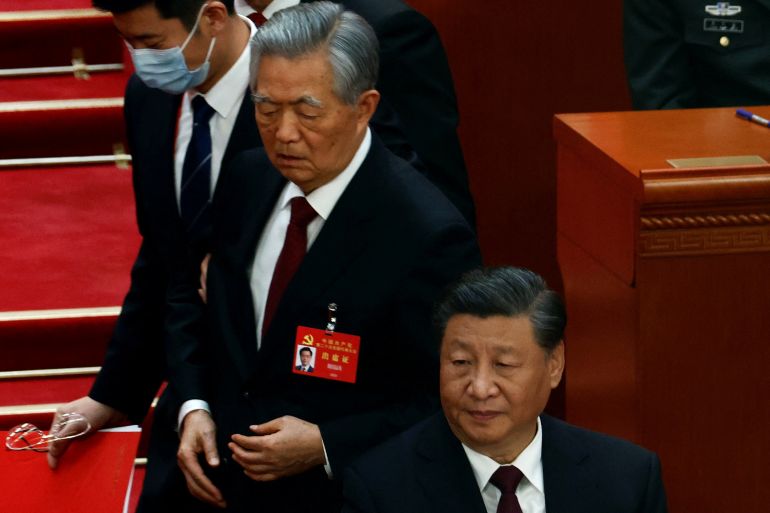‘Not feeling well’: China’s ex-leader led out of party congress
The 79-year-old Hu Jintao seemed reluctant to leave with two men who approached him while he was seated next to President Xi Jinping.

Former Chinese President Hu Jintao was unexpectedly escorted out of Saturday’s closing ceremony of the Communist Party Congress in a dramatic moment that disrupted the highly choreographed event.
The frail-looking 79-year-old seemed reluctant to leave the front row of proceedings at Beijing’s Great Hall of the People, where he was sitting next to President Xi Jinping.
Keep reading
list of 4 itemsXi set to reveal China’s new senior leadership as Congress ends
Japan, Australia leaders sign new security pact to counter China
What’s on the agenda for China’s 20th Communist Party Congress?
A steward attempted to take a sitting Hu by the arm before being shaken off. The steward then attempted to lift Hu with both hands from under the armpits.
After an exchange of about a minute, in which Hu spoke briefly with Xi and Premier Li Keqiang, he was led out of the hall.
A seated Xi was filmed holding papers down on the desk as Hu tried to grab them. Hu patted Li’s shoulder as he left with most of his colleagues staring firmly ahead.
‘Now he is much better’
Hu was “not feeling well” when he was unexpectedly removed from the closing ceremony, state media reported.
“Xinhuanet reporter Liu Jiawen has learned that Hu Jintao insisted on attending the closing session … despite the fact that he has been taking time to recuperate recently,” state-run news agency Xinhua said on Twitter.
“When he was not feeling well during the session his staff, for his health, accompanied him to a room next to the meeting venue for a rest. Now he is much better.”
The week-long congress was held mostly behind closed doors, but Hu’s departure occurred shortly after journalists were allowed in to cover the closing ceremony.
Early drama: Hu Jintao seen being led out soon after reporters are led into the main hall pic.twitter.com/pRffGZF60I
— Danson Cheong (@dansoncj) October 22, 2022
Leadership shuffle
Hu’s abrupt exit came just before the 2,300 delegates at the congress voted unanimously to endorse Xi’s “core” leadership position.
Search results for “Hu Jintao” on the Twitter-like Weibo platform appeared to be heavily censored with the most recent result dated Friday and posts limited to those of official accounts.
Meanwhile, Li, China’s number two official, was among four of the seven members of the nation’s all-powerful Politburo Standing Committee who will not be reappointed in a leadership shuffle on Sunday.
Li and three others were missing from the ruling Communist Party’s new 205-member Central Committee that was approved at the closing session. The congress set the leadership and agenda for the next five years.
Only Central Committee members can serve on the Standing Committee.
Xi is all but assured of being formally announced on Sunday as the party’s general secretary for another five years, also allowing him to become president for a third straight time.
Since taking over from Hu 10 years ago, Xi has become China’s most authoritarian leader since Mao Zedong.
Xi has crushed opposition to his rule inside the party with many of his rivals jailed on corruption charges, and he has shown no tolerance for any form of public dissent.
‘Old mindset of invasion’
Analysts were closely watching for whether the party charter would be amended to enshrine “Xi Jinping Thought” as a guiding philosophy, a move that would put Xi on a par with Mao.
That did not take place, though the resolution did call the creed “the Marxism of contemporary China and of the 21st century”, adding it “embodies the best Chinese culture and ethos of this era”.
Xi previously abolished the presidential two-term limit in 2018, paving the way for him to rule indefinitely.
“Xi’s power will be akin to that of the dictator of China, and there will be next to no scope for anyone to advise him to attempt course correction,” said Steve Tsang, director of the SOAS China Institute at the University of London.
One of the key questions outstanding is if Xi will appoint a potential successor to the Politburo Standing Committee. This could be answered on Sunday when the Standing Committee is unveiled.
Delegates also on Saturday enshrined in the party’s constitution opposition to Taiwanese independence. Beijing has always pledged to retake the self-ruled democratic island, by force if necessary.
Taiwan’s Mainland Affairs Council accused China of harbouring an “old mindset of invasion and confrontation”, and called on Beijing to “resolve differences through peaceful, equitable and realistic means”.